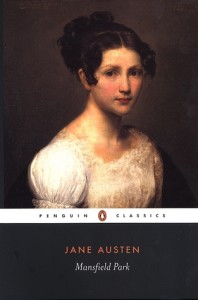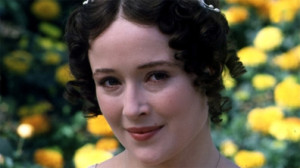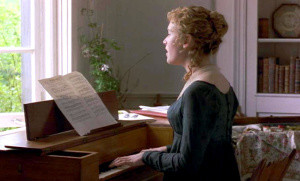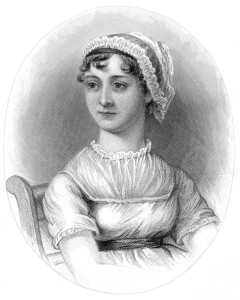Moments of Literary Joy: Jane Austen’s Mansfield Park
This week’s moment of literary joy comes from chapter 11 of Jane Austen’s Mansfield Park, which I’ve just been teaching in my Nineteenth-Century British Fiction class.
Here’s the passage:
Fanny agreed to it, and had the pleasure of seeing him continue at the window with her, in spite of the expected glee; and of having his eyes soon turned, like hers, towards the scene without, where all that was solemn, and soothing, and lovely, appeared in the brilliancy of an unclouded night, and the contrast of the deep shade of the woods. Fanny spoke her feelings. “Here’s harmony!” said she; “here’s repose! Here’s what may leave all painting and all music behind, and what poetry only can attempt to describe!”
Now, many readers, even avid Jane Austen fans, dislike Fanny Price, the heroine of this novel. She’s too meek and good, too compliant and quiet and shy for the taste of many Austen readers. Many who love witty, clever, talkative, imperfect Elizabeth Bennet of Pride and Prejudice can’t abide her.
I love Fanny. Is it because this was the first Jane Austen novel I ever read (in Martin Price’s class at Yale)? Is it because I was a quiet, shy girl myself? Hard to say. But I love Fanny, despite her perfections.
But what I love even more are the moments in Mansfield Park where Fanny is not so perfect. You have to look really hard for them. This is one of them.
Fanny is in love with her cousin Edmund. (Her first cousin?! Yes. That’s a subject for another day.) Edmund, however, is in love with Mary Crawford, who is everything Fanny is not—witty, quick, clever, sharp of tongue, irreverent.
Fanny must endure many moments of agony first watching Edmund and Mary together and then listening to him sing her praises after she has left.
This passage comes at such a moment. Mary has just trotted off to join in a glee with Edmund’s sisters. Fanny is pleased that he doesn’t follow Mary to the pianoforte to listen, but evidently his design in staying behind is to enjoy mooning over Mary to the long-suffering Fanny.
He has just said: “There goes good–humour, I am sure,’ . . . .There goes a temper which would never give pain!’”
Fanny agrees, of course. She never overtly disagrees when he praises Mary, at least not until much further on. But then notice what she does. She looks out at nature rather than in at the singing women. And she says, ““Here’s harmony!” . . . . “here’s repose! Here’s what may leave all painting and all music behind.”
She echoes Edmund’s phrasing “There goes, there goes”/”Here’s, here’s”—but she implicitly corrects him in doing so. She praises nature, not Mary. That is where what is praiseworthy is to be found.
And she gets in a final, subtle dig. While Mary is singing, Fanny tells Edmund that the beauty of nature leaves all music behind.
Mostly perfect. Almost always perfect. But not quite perfect. That’s why I love Fanny Price.








